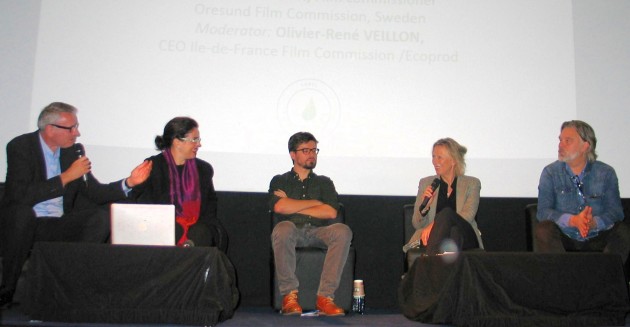
At the conference on carbon free audiovisual productions that was hosted by Ecoprod and Film4Climate at the Cinéma Le Balzac in Paris on November 25, producers and crew members gained an insight into sustainable film production practices. „We have the tools, we have the solutions, and we have the companies that are able to deliver the services“, states Olivier-René Veillon, Founding member of Ecoprod and Chief Executive Officer of Ile-de-France Film Commission. In this French region are more than 2,000 producers. Ninety percent of French production, as well as a great deal of international production, takes place in Paris and the surrounding regions because of the attractiveness of the city and its surroundings.
In total, there are about 7,000 production companies in France for which Ecoprod developed tools such as the Carbon Clap. “We need a tool to measure their carbon sources”, underlines Catherine Puiseux, Ecoprod Founder and CSR Director, TF1 Group. In Great Britain, BAFTA provides British producers with the carbon calculator 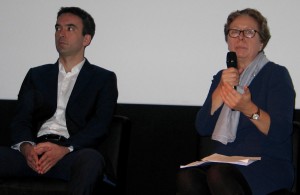 Albert. “Round about 320 companies are using Albert”, reports Jeremy Mathieu, Sustainability Advisor at BBC. Among them are all commissioned productions for Sky. “We already completed 2,500 footprints.” Furthermore, the organization provides the industry with the certification Albert+ when they are embedding best practices in order to lower their carbon foot print. Among the effective measures are the use of low energy lights and electric cars.“In average, productions are reducing their carbon footprint by 15 percent which comes down to about 6,000 British pounds.”
Albert. “Round about 320 companies are using Albert”, reports Jeremy Mathieu, Sustainability Advisor at BBC. Among them are all commissioned productions for Sky. “We already completed 2,500 footprints.” Furthermore, the organization provides the industry with the certification Albert+ when they are embedding best practices in order to lower their carbon foot print. Among the effective measures are the use of low energy lights and electric cars.“In average, productions are reducing their carbon footprint by 15 percent which comes down to about 6,000 British pounds.”
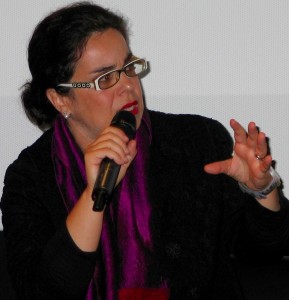 While the Film Commission Hamburg already gave out 61 Green Shooting Cards to sustainable produced features film, documentaries, shorts and TV shows all over Germany, as Christiane Dopp from the Filmförderung Hamburg Schleswig-Holstein points out, in Belgium the green production started in 2010 with the film Time of my Life by Nic Balthazar. “Meanwhile, there are 29 features films and 14 TV series by 23 companies produced within the e-mission program”, underlines Evet Erikksson, Sustainablity Advisor, Flanders Audiovisual Fund. In Italy, Nevina Satta, CEO of Sardegna Film Commission, launched the initiative Heroes 2020, a program for short film that are dealing with climate change. “In Italy we have a new generation of producers”, states Satta, “but also the tools for sustainable productions.”
While the Film Commission Hamburg already gave out 61 Green Shooting Cards to sustainable produced features film, documentaries, shorts and TV shows all over Germany, as Christiane Dopp from the Filmförderung Hamburg Schleswig-Holstein points out, in Belgium the green production started in 2010 with the film Time of my Life by Nic Balthazar. “Meanwhile, there are 29 features films and 14 TV series by 23 companies produced within the e-mission program”, underlines Evet Erikksson, Sustainablity Advisor, Flanders Audiovisual Fund. In Italy, Nevina Satta, CEO of Sardegna Film Commission, launched the initiative Heroes 2020, a program for short film that are dealing with climate change. “In Italy we have a new generation of producers”, states Satta, “but also the tools for sustainable productions.”
 Almost all the guidelines for green film production are inspired by the Best Practices, developed by the PGA Green in the US. Furthermore, PGA Green representatives such as producer Lydia Pilcher are bringing their expertise to other countries and continents. “Recently, when we were shooting Disney’s Queen of Katwe in Uganda we trained four local crew members as Sustainability Managers”, says Pilcher. One of the most important missions is to convince the director to go green. The director is the first one who needs to be on board to give a positive role model. “He can’t show up with a plastic bottle on set of a green production”, sums up Pilcher. “That would be a No go.”
Almost all the guidelines for green film production are inspired by the Best Practices, developed by the PGA Green in the US. Furthermore, PGA Green representatives such as producer Lydia Pilcher are bringing their expertise to other countries and continents. “Recently, when we were shooting Disney’s Queen of Katwe in Uganda we trained four local crew members as Sustainability Managers”, says Pilcher. One of the most important missions is to convince the director to go green. The director is the first one who needs to be on board to give a positive role model. “He can’t show up with a plastic bottle on set of a green production”, sums up Pilcher. “That would be a No go.”
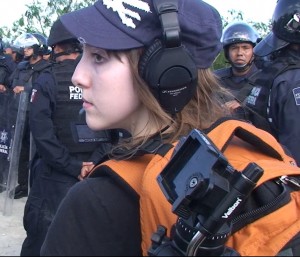 To fight climate change is also the mission of 23-year-old filmmaker Slater Jewell-Kemker who presented clips of her first feature-length film An Inconvenient Youth, which she began shooting when she was fifteen years old. "We’ve now gotten to the point where we can’t reverse climate change, but we can still lessen its effect", says Slater Jewell-Kemker. "We can still adapt in a way that is sustainable and efficient and that will ensure our survival." In her film that she describes as An Inconvenient Truth meets Boyhood, she follows the rise of the global youth climate movement. "Copenhagen has been inspiring, but frankly, we can’t let it happen again", says the filmmaker in view of the COP21 in Paris. "It’s a brutal reminder of the ticking clock of climate change, and it hopefully shows that we can do better."
To fight climate change is also the mission of 23-year-old filmmaker Slater Jewell-Kemker who presented clips of her first feature-length film An Inconvenient Youth, which she began shooting when she was fifteen years old. "We’ve now gotten to the point where we can’t reverse climate change, but we can still lessen its effect", says Slater Jewell-Kemker. "We can still adapt in a way that is sustainable and efficient and that will ensure our survival." In her film that she describes as An Inconvenient Truth meets Boyhood, she follows the rise of the global youth climate movement. "Copenhagen has been inspiring, but frankly, we can’t let it happen again", says the filmmaker in view of the COP21 in Paris. "It’s a brutal reminder of the ticking clock of climate change, and it hopefully shows that we can do better."
 The conference on carbon free audiovisual productions was rounded up with a declaration by Film4Climate and Ecoprod. The Charter commits to eliminate the social and environmental negative impacts of film and other visual media productions. “It strongly advocates for the adoption of industry-wide incentives that will encourage socio-environmental practices including, but not limited to biodiversity conversation, waste disposal and carbon reduction”, concludes Don Ranvaud, Creative Producer, Film4Climate.
The conference on carbon free audiovisual productions was rounded up with a declaration by Film4Climate and Ecoprod. The Charter commits to eliminate the social and environmental negative impacts of film and other visual media productions. “It strongly advocates for the adoption of industry-wide incentives that will encourage socio-environmental practices including, but not limited to biodiversity conversation, waste disposal and carbon reduction”, concludes Don Ranvaud, Creative Producer, Film4Climate.




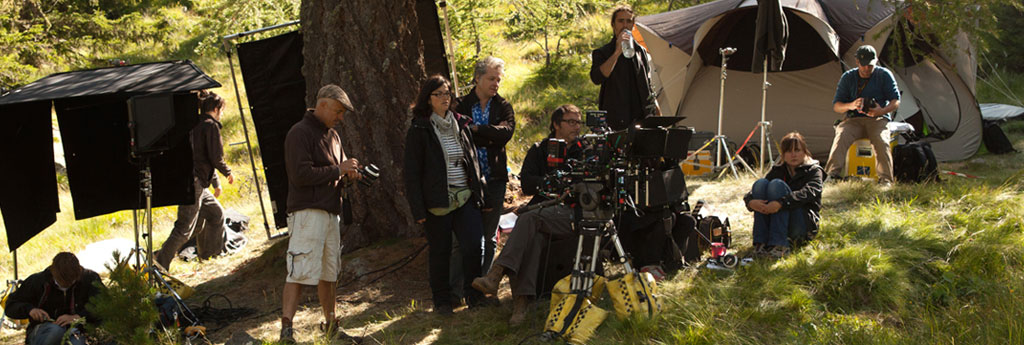








 Robert Redford
Robert Redford Hannes Jaenicke
Hannes Jaenicke Nic Balthazar
Nic Balthazar Nadeshda Brennicke, Actress
Nadeshda Brennicke, Actress Darren Aronofsky, Director, Noah / Jury President, 65th Berlin International Film Festival
Darren Aronofsky, Director, Noah / Jury President, 65th Berlin International Film Festival Tim Bevan
Tim Bevan Thekla Reuten
Thekla Reuten Rachael Joy
Rachael Joy Nikola Rakocevi
Nikola Rakocevi Nadja Schildknecht
Nadja Schildknecht Michael Bully Herbig
Michael Bully Herbig Lars Jessen
Lars Jessen Helen Hunt
Helen Hunt Douglas Trumbull
Douglas Trumbull Dieter Kosslick, Director Berlin International Film Festival
Dieter Kosslick, Director Berlin International Film Festival Benoit Delhomme
Benoit Delhomme Jeremy Irons
Jeremy Irons